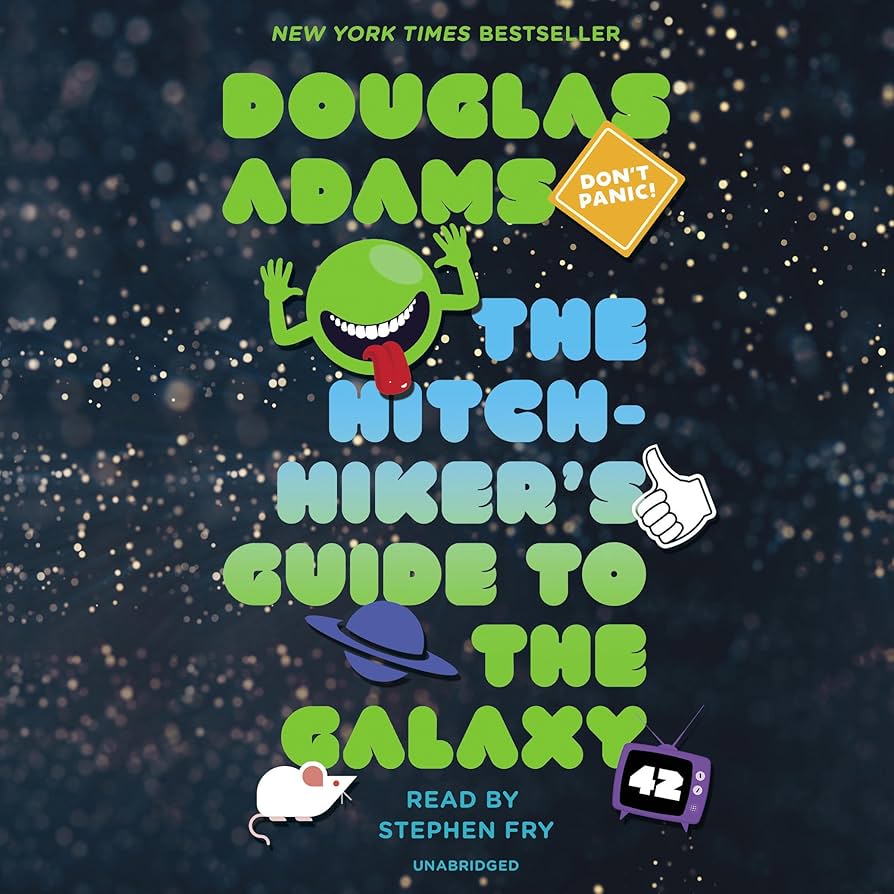Table of Contents
Cult Classic of Cosmic Comedy
Douglas Adams’ The Hitchhiker’s Guide to the Galaxy is a landmark in science fiction comedy, blending absurd humor, biting satire, and philosophical inquiry. Originally a radio play, it quickly became a beloved novel, spawning a multi-book “trilogy,” adaptations, and a devoted global following.
At first glance, it’s a madcap space adventure about Arthur Dent, an unassuming Englishman swept off Earth moments before its destruction. But beneath the slapstick, Adams uses wit and wit’s edge to ask profound questions about existence, meaning, and the often bewildering human condition.
Plot Summary: Earth’s End and the Cosmic Roadtrip
Arthur Dent’s ordinary life is upended when his house—and then Earth itself—is demolished to make way for a hyperspace bypass. Rescued by Ford Prefect, an alien researcher for the eponymous electronic guidebook, Arthur embarks on a journey through space aboard the starship Heart of Gold.
Together with a bizarre crew—Zaphod Beeblebrox, the two-headed ex-President of the Galaxy; Marvin, a perpetually depressed robot; and Trillian, the only other human survivor—they travel through improbable scenarios, encountering Vogons, Babel fish, and the infamous answer to life, the universe, and everything: 42.
The story balances chaotic humor with glimpses of melancholy and genuine curiosity about the universe’s mysteries.
Themes: Absurdity, Meaning, and the Cosmic Joke
1. The Absurdity of Existence
At its core, the novel is an ode to absurdism, recalling philosophies of Camus and Beckett. Life is chaotic, often nonsensical, and our search for meaning can be both comical and futile. Adams dramatizes this through events like bureaucratic Vogons who destroy planets without remorse and a supercomputer’s ultimate answer being an enigmatic number.
2. The Search for Meaning
Arthur’s journey mirrors the human quest for purpose. Despite advanced technology and cosmic wonders, answers remain elusive. The Guide itself, with its ironic “Don’t Panic” slogan, embodies a philosophy of humility and humor in the face of the incomprehensible.
3. Technology and Bureaucracy
Adams skewers technological optimism and institutional rigidity. The Vogons represent oppressive bureaucracy, while the Guide’s unreliable electronic wisdom highlights the pitfalls of overreliance on technology. The satire extends to politics, leadership, and human folly.
Style and Tone: Witty, Fast-Paced, and Inventive
Adams’ prose is sharp, irreverent, and punctuated by comedic timing. His style blends dry British wit with inventive language, playful neologisms, and surreal imagery. The narrative frequently breaks the fourth wall, addressing readers directly or pausing to explain ridiculous facts with a deadpan tone.
The novel’s episodic structure propels a rapid pace, but each vignette unfolds with clever detail. Humor serves as a vehicle for deep philosophical inquiry, making the book entertaining yet thought-provoking.
Iconic Characters: A Motley Crew
- Arthur Dent – The everyman bewildered by a universe gone mad. His dry observations ground the story’s chaos.
- Ford Prefect – Alien researcher, sarcastic guide to the galaxy’s wonders and absurdities.
- Zaphod Beeblebrox – Eccentric, self-centered ex-President whose antics parody political leaders.
- Marvin the Paranoid Android – A robot whose deep pessimism contrasts sharply with his vast intelligence, highlighting themes of depression and existential despair.
- Trillian – The only other human survivor, pragmatic and curious, a voice of reason amid madness.
Each character embodies facets of humanity or alien absurdity, making the ensemble both comedic and deeply symbolic.
Symbolism and Philosophical Underpinnings
- The Number 42: The ultimate answer to life’s mysteries, yet utterly meaningless without the right questions. This symbolizes the human desire for simple answers to complex problems.
- The Guide: Represents knowledge that is practical but incomplete, a metaphor for the limits of human understanding and technology.
- Babel Fish: A symbol of communication and misunderstanding, allowing all languages to be understood but highlighting that understanding doesn’t always lead to harmony.
Adams mixes playful absurdity with existential themes, forcing readers to confront the chaos and ambiguity underlying existence.
Cultural Impact and Legacy
The Hitchhiker’s Guide to the Galaxy transformed science fiction by introducing humor as a tool for philosophical exploration. Its influence extends beyond literature into TV, film, and even technology culture (for example, the “Don’t Panic” motto and the number 42 have become enduring memes).
The book encourages readers to find humor in uncertainty and humility in knowledge—valuable lessons in an era of rapid technological change and existential anxiety.
Key Takeaways
- A masterful blend of humor and philosophy wrapped in a sci-fi adventure.
- Highlights the absurdity of life and the limits of human understanding.
- Characters personify facets of humanity grappling with cosmic scale questions.
- Remains deeply relevant for readers curious about existence and meaning.
- Invites embracing uncertainty with wit, humility, and a towel.
TL;DR
Douglas Adams’ The Hitchhiker’s Guide to the Galaxy is much more than a comic romp through space. It’s a brilliant exploration of the absurd, a satirical critique of society and science, and a warm-hearted meditation on the human condition. Its blend of humor and insight makes it a timeless read—one that invites laughter and reflection in equal measure.
Whether you’re a sci-fi fan or a seeker of deeper meaning cloaked in jokes, this book is a stellar journey worth taking. And remember: always know where your towel is.

Leave a Reply